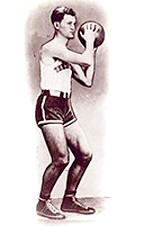My father, Glenn Roberts Sr., should have, by now, been
inducted into the National Basketball Hall of Fame in
Springfield, Mass.
In 1978, when it became apparent
that Glenn was terminally ill, over 100 respected coaches,
former college opponents, teammates, sports writers and
editors, referees and others corresponded with the Hall of
Fame in hope of seeing Glenn Roberts inducted prior to his
death. Two, who spoke up for Glenn Roberts were Hall of
Famers Denny Crum of University of Louisville and Ben
Carnevale of the Navy. A few other notables were coaches Ray
Mears of University of Tennessee., Terry Holland of
University of Virginia, Joe Hall of University of Kentucky
and sports editors Furman Bisher of Atlanta and Tom Siler of
Knoxville.
Glenn Roberts has not been inducted into
the Hall of Fame because he was from the South. I say this
because it is a fact that none of the 57 college players
born 1935 or before, represents the South as a member of the
Basketball Hall of Fame. This was not intentional, but was
an inevitable process that occurred because the game's
origin was New England with the powerful New York City press
subsequently writing early college basketball history. Many,
especially Southerners, contend that several basketball
reputations were made, or at least greatly enhanced, when
players were given the chance to show their stuff under the
scrutinizing eye of the all-powerful Northeast press,
especially in Madison Square Garden. The great Hank Luisetti
was the prime example for this. Glenn Roberts never had this
exposure opportunity.
Let us look at some reasons why
Glenn Roberts should be in the Hall of Fame. First, at
Pound's high school, Christopher Guest, in Glenn's junior
and senior year (1930-31) the team's record was 28 & 2 and
35 & 0 with a state championship both years.
At Emory
and Henry College (1931-35) he scored 2,013 points in 104
games for a 19.4 per game average. This was a new scoring
record that stood until the early 1950s and still stands for
play prior to the 1937 revision of the center-jump rule.
This accumulative scoring and per game average totally
dwarfed every college statistic prior to 1935. His scoring
record was featured in "Believe It Or Not." In the early
1930s team scores were typically something like 25 to 30
points per team total. A 19-plus average would today be
comparable to something like a 45 to 50-point average. The
four-year team record was 90 wins and 14 losses.
In a
game against Union College he scored 38 points. He is the
first player in college basketball to have a 50-point game.
This occurred against the barnstorming "House of David" team
who had a 7-foot center at the time.
Glenn Roberts'
opponents were large and small schools that regularly
included Tennessee, Richmond, Virginia Tech, William and
Mary, George Washington, University of Virginia, etc. Glenn
Roberts was All-Conference and All-State each of his four
years and All-American his senior year. In 1980 he was
inducted into the Virginia Sports Hall of Fame.
What
was Glenn's secret to being such a prolific scorer? It was
the use of a jump shot. Award winning historian, Stephen
Fox, in his book "Big Leagues," states that "Glenn Roberts
was able to score so prolifically because he had a weapon
(jump shot) never seen before."
He received many
professional offers after college, and while coaching at
Norton, he was induced by Firestone of the NBL (National
Basketball League) to play for them (1938-39 season). The
NBL was the top professional league of the day and changed
its name to the NBA in 1949. Firestone won the league
championship with a record of 24 and 3. This .875 won/lost
record stands as the highest in the history of the NBL or
NBA.
After this one spectacular season, Glenn formed
a team with his six brothers, five of whom were Virginia
high school all state, and they dominated the Northern Ohio
industrial leagues during the early 1940s. During the season
of 1944-45 the brothers barnstormed Virginia, Tennessee,
Kentucky, North Carolina, and West Virginia raising money
for war bonds. For example, on March 10, 1945, $50,000 was
raised in a victory over Milligan College.
There is a
renewed move afoot, by several prominent people, to have
Glenn Roberts inducted into the Hall of Fame. A grassroots
movement would have equal impact; therefore, if you feel he
is worthy of this honor, it would be greatly appreciated if
you would state your reasons why in an e-mail to the Hall of
Fame.
Send an e-mail to
doleva@hoophall.com
and/or
mzeysing@hoophall.com
It would be further appreciated if you would send me a blind
copy to
gerpar8@comcast.net
We need to let the National Basketball Hall of Fame
know that the South and Glenn Roberts were indeed a
significant part of the early days of basketball. Thank you
for your consideration.


















